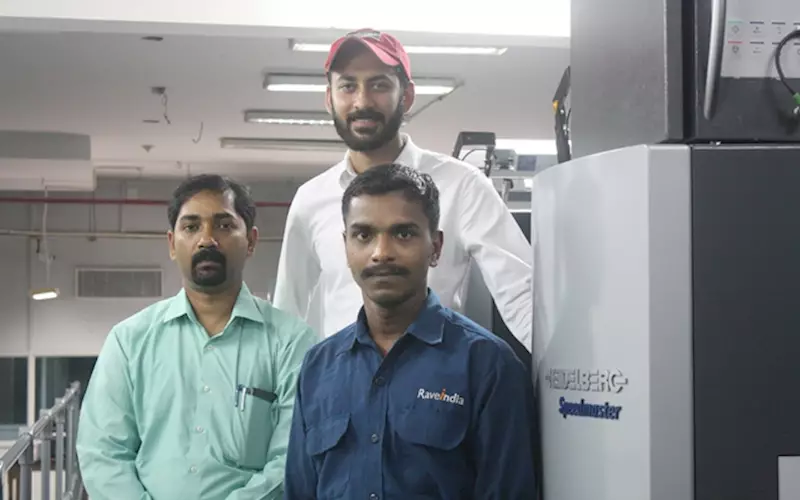Rave targets rigid box segment
Recently, Rave India (comprising of its commercial arm Rave Scans and packaging arm Rave Packaging), with facilities in Naraina, Gurgaon and Manesar, shifted its entire production facility under one roof to Manesar, a move, which according to Shiv Bhatnagar of Rave “will increase our efficiency manifold”.
16 Sep 2015 | By Rahul Kumar & PrintWeek India
Ultimately, he said, production at multiple locations is a cost. “Now, we have control on manpower and have a simple but effective system and process, instead of a complex system,” Bhatnagar adds.
Recently, Rave became the first Indian firm to install the Speedmaster CD102-6+LX with Foilstar from Heidelberg. Bhatnagar says the only way to enter into the market is to create one. Right now, the demand is limited, but it will grow soon, he says, adding that the machine can achieve results which have not been seen before and it is environment-friendly.
Rave has also invested in India’s first Next Gen Image Control by Heidelberg. It is a colour management system, which can be attached to a four-colour printing machine, and with Prinect workflow and Heidelberg CTP, it can do wonders with colour management and reduce wastage, variation and rejections drastically. According to Bhatnagar, this investment shows Rave’s commitment towards quality.
An area where Rave seeks to create a market is rigid boxes. It is the only company in India which has three Emmeci rigid box-making machines. One is installed and operating while the rests are on their way. The first Emmeci was MC 2004. The new ones are MC 2004 APP advance, which is the highest model in 2004 series.
The company has also invested in Bobst Nova Cut 106 E and Vision Fold folder-gluer. The company has also upgraded its old models of Heidelberg machines. Besides, Rave has also invested in Esko software solution and Kongsberg cutting table. It is also in the process of establishing a high-end designing lab and ink kitchen.
Bhatnagar says the company has invested around Rs 85 crore in the installations. Rave has set up two factories adjacent to each other, one with a carpet area of 1,50,000 sq/ft and the other with 80,000 sq/ft and the existing Naraina plant with 30,000 sq/ft, which adds to 2,60,000 sq/ft. The head office of the company will remain the same, at Naraina.
“The shifting process has been a long one, as we did not want our production to get disturbed. We shifted machines from our Gurgaon unit one by one. The complete factory set up will take time as we are following the same policy with the machines coming from Naraina,” he says.
Unlike other packagers, Rave is not focusing on mono cartons. “We see a rising demand for rigid boxes in India, including boxes such as high-end sweet boxes, perfume and cosmetic boxes, and boxes for electronic items. We are focusing on this particular segment,” says Bhatnagar. And for this, the company, with three Emmeci machines, is ready. “We will be able to produce more than 12 lakh boxes per month once the plant is ready,” he adds.
Why this single-minded focus on rigid boxes? “People hardly talk about rigid boxes in India. But it has good market potential,” he says. “We want to be a decently profitable company and want to do something new.” He agrees that the market for rigid box is limited and converters are often impatient to follow up on their clients.
So, this is the agenda with Rave. Something is lacking in the market and the company wants to fill this void, armed with cutting-edge technology from Emmeci, Heidelberg and Bobst.











 See All
See All